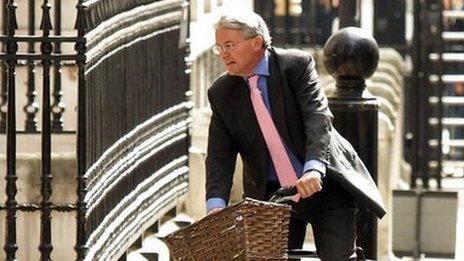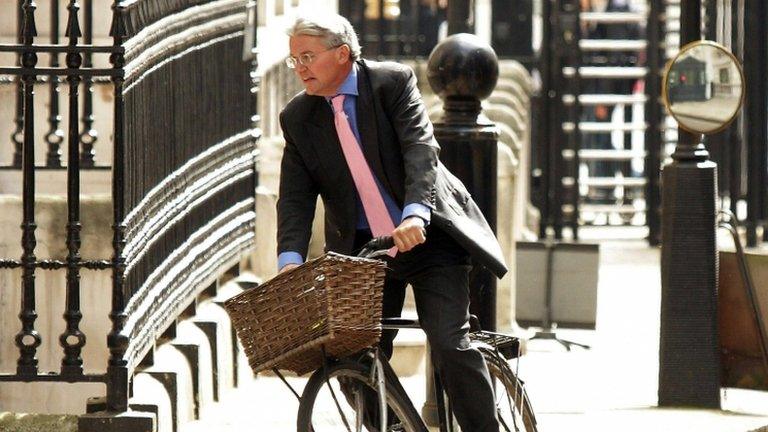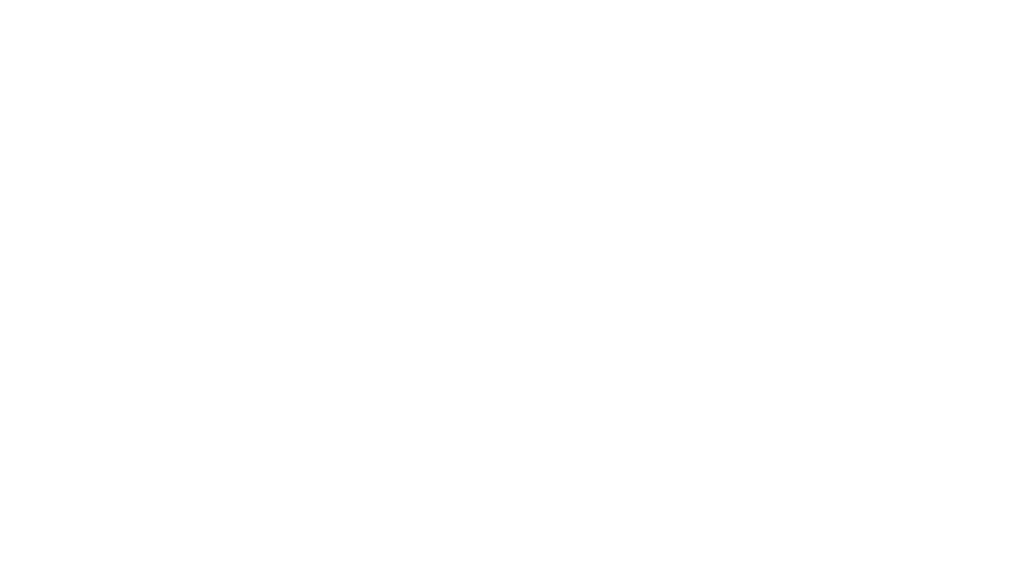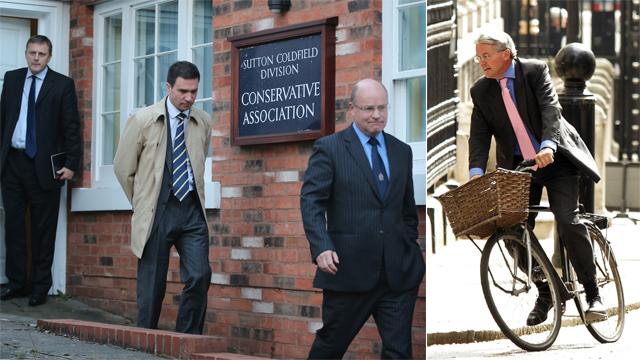Plebgate: PM says police owe Andrew Mitchell apology
- Published
David Cameron says Andrew Mitchell is owed an apology by police whose conduct "was not acceptable"
Andrew Mitchell is "owed an apology" by police over the "plebgate" row, Prime Minister David Cameron has said.
He said the conduct of three officers from the Police Federation towards the ex-minister was "not acceptable".
Three police chiefs have been criticised for their decision not to discipline the officers over their account of a meeting with Mr Mitchell.
But a police and crime commissioner says the police watchdog made an "unwarranted attack" on the chiefs.
The chief constables of West Mercia, Warwickshire and West Midlands Police will appear before the Home Affairs Select Committee on 23 October.
On Tuesday, the Independent Police Complaints Commission (IPCC) said the officers who spoke to Mr Mitchell should have faced misconduct hearings for misrepresenting what the former chief whip said in a private meeting last October about a row at the gates of Downing Street the month before.
Mr Mitchell had been accused of describing policemen at Downing Street as "plebs" after they refused to let him through the gates with his bicycle.
As the row between the then-cabinet minister and the police intensified, Mr Mitchell met Insp Ken MacKaill, of West Mercia Police, Det Sgt Stuart Hinton, of Warwickshire Police, and Sgt Chris Jones, of West Midlands Police - acting on behalf of the Police Federation which represents rank-and-file officers - at his constituency office in Sutton Coldfield.
Speaking after the meeting, Insp MacKaill claimed the ex-chief whip would not provide an account of the incident and called for his resignation.
Mr Mitchell recorded the meeting and a transcript, external issued by the IPCC showed that he had spoken at length about what happened, and, while he admitted swearing, had denied using the word "pleb" or insulting the police.
It also showed that during that meeting, the federation representatives said the integrity of their Metropolitan Police colleagues was "no longer intact".
'Better redress'
Keith Vaz: "There is no point in having a regulator and hearing conclusions if you don't listen to what the regulator says"
After an internal investigation into their account of the meeting, the three chief constables concluded there was no case to answer for misconduct.
However, a letter sent by the IPCC's Deputy Chair Deborah Glass to Warwickshire's Police and Crime Commissioner Ron Ball - who has criticised the watchdog for its handling of the affair - states that in the first draft of the report submitted to the IPCC, the senior investigating officer did conclude there was a case to answer for misconduct. This was changed in the final report.
The chairman of the Home Affairs Select Committee, Keith Vaz, later requested that the committee see both reports.
"We didn't until today know that there was a first draft which suggested officers may well have been involved in misconduct and a final draft which removed that," he told the BBC.
"We want to be extremely fair to all sides. At the moment we just have the report that has been prepared by the IPCC which is pretty damning."
He added that it was "another twist to a very sorry saga".
Speaking at Prime Minister's Questions in the Commons, Mr Cameron said "these things should be properly investigated".
Home Secretary Theresa May has said the IPCC's report "made troubling reading". Meanwhile, the Crown Prosecution Service is deciding if charges should be brought against police officers involved in the original row in Downing Street.
Mr Cameron said: "I agree 100% with what the Home Secretary said. What's being discussed here is the fact that... the former chief whip had a meeting with Police Federation officers in his committee.
"Fortunately this meeting was recorded, so he has been able to prove that what he said was true and what the police officers said was untrue."
Mr Cameron said it was right for the select committee to "discuss this with the chief constables concerned and try to get to the bottom of why better redress has not been given".
Ken Mackaill speaking after his meeting with Andrew Mitchell: "He has no option but to resign"
A spokesman for Number 10 said: "Incidents such as this do bring people to question their trust in the police."
But he went on to stress that the majority of officers "operate to the highest standards and do a very dangerous job on behalf of the public".
IPCC Chair Dame Anne Owers and Ms Glass, and Police Federation chairman Steve Williams have also been asked to appear before the select committee.
In a statement on Tuesday, the three chief constables said they welcomed the opportunity to speak.
The decisions following the investigation had been "carefully considered", they said.
They added the IPCC had chosen not to exercise powers that would have allowed it to order the three forces to hold misconduct proceedings.
Later, the IPCC announced it had written to the three chief constables, as well as their police and crime commissioners, to correct "a number of inaccuracies in their recent public statements". It did not, however, publicly detail its concerns.
The Police Federation of England and Wales said it was "shocked" by the IPCC's comments, external which "will naturally undermine the considered findings of the investigation in the eyes of the public".
In a statement, external it said: "Either the IPCC are capable of supervising investigations or they are not. If they feel that they are capable of doing so... the proper and responsible course must be to accept the investigation findings."
West Midlands Police and Crime Commissioner Bob Jones said comments attributed to Ms Glass in the IPCC statement about the chief constables was "gratuitous and in my opinion an abuse of process".
He said: "I will be writing to the IPCC asking for an apology for what I consider an unwarranted attack on the integrity of the investigating officers and the senior officers who sat in judgement."
- Published16 October 2013
- Published27 November 2014

- Published15 October 2013

- Published24 September 2013

- Published12 October 2012

- Published4 October 2013

- Published23 October 2013
